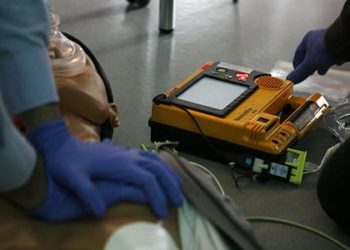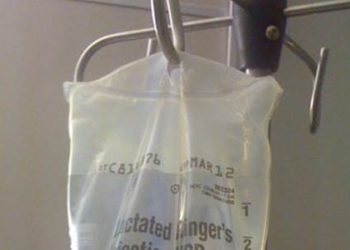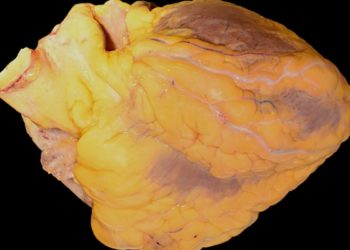No effect of crystalloid type on in-hospital death and length of stay in non-critically ill patients
1. Patients treated with either balanced crystalloids or normal saline did not differ in number of hospital-free days alive after their emergency department visit.
2. Risk for a secondary composite outcome of major adverse kidney events was lower in the balanced crystalloids group.
Evidence Rating Level: 1 (Excellent)
Study Rundown: Intravenous crystalloid solutions are a cornerstone of medical therapies. Although normal saline is the most commonly used crystalloid in the United States, there is theoretical concern that its composition might cause kidney inflammation and injury through induction of hyperchloremic metabolic acidosis. These effects are understudied in the non-critically ill patient population. This randomized controlled trial sought to determine whether outcomes differed between non-intensive care unit (ICU) hospitalized patients treated with either normal saline or balanced crystalloids in the emergency department. The primary outcome was number of hospital-free days after discharge before day 28. No difference was found between the study arms in the rates of the primary outcome, with no evidence of heterogeneity of treatment effect across numerous subgroups. Risk for a secondary composite outcome of major adverse kidney events was lower in the balanced crystalloids group.
Strengths of this study include its pragmatic, well-powered trial design with multiple sensitivity analyses. A notable limitation is recruitment of patients from only one medical center. As secondary outcomes are hypothesis-generating, more studies are needed to replicate the effect on major adverse kidney events.
Click to read the study, published in NEJM
Relevant Reading: Association Between a Chloride-Liberal vs Chloride-Restrictive Intravenous Fluid Administration Strategy and Kidney Injury in Critically Ill Adults
In-Depth [randomized controlled trial]: This was a randomized controlled trial conducted at Vanderbilt University Medical Center from 2016 to 2017. Eligible patients must have received at least 500 ml of intravenous crystalloid in the emergency department and be subsequently hospitalized outside of an ICU. A total of 13,347 patients were included in this study, with patients randomized to either normal saline (n = 6639) or balanced crystalloids (n = 6708; either Lactated Ringer’s or Plasma-Lyte A). Treatments were randomly assigned to the calendar month. The primary outcome was number of days alive and outside the hospital between the initial emergency department encounter and day 28; if a patient died during this time or was hospitalized for more than 28 days, they had zero hospital-free days alive. A major secondary outcome was a composite of adverse kidney events which included death, new renal-replacement therapy, or persistent renal dysfunction.
The median crystalloid volume received by patients in the trial was 1079 ml, with the vast majority of balanced crystalloids administered as lactated Ringer’s. The primary outcome was similar between both treatment groups (median 25 days; adjusted odds ratio with balanced crystalloids [aOR], 0.98; 95% confidence interval [CI], 0.92 to 1.04; p = 0.41). The risk for composite adverse kidney events within 30 days was lower with balanced crystalloid treatment (4.7%) compared to the normal saline (5.6%) treated patient ([aOR], 0.82; 95%CI, 0.70 to 0.95; p = 0.01). Per-protocol and intention-to-treat analysis produced similar results.
Image: PD
©2018 2 Minute Medicine, Inc. All rights reserved. No works may be reproduced without expressed written consent from 2 Minute Medicine, Inc. Inquire about licensing here. No article should be construed as medical advice and is not intended as such by the authors or by 2 Minute Medicine, Inc.




![The ABCD2 score: Risk of stroke after Transient Ischemic Attack (TIA) [Classics Series]](https://www.2minutemedicine.com/wp-content/uploads/2013/05/web-cover-classics-with-logo-medicine-BW-small-jpg-350x250.jpg)


